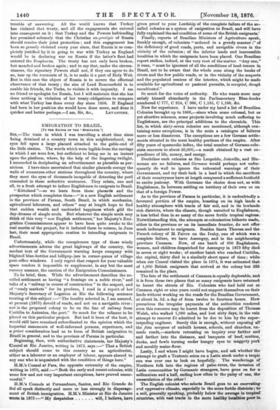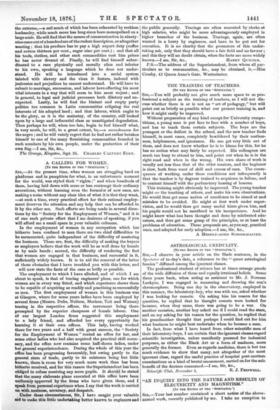EMIGRATION TO BRAZIL.
[TO THE EDITOR OF THE "SPECTATOR."] SIR,—The train in which I was travelling a short time since being detained at a country town in this neighbourhood, my eyes fell upon a large placard attached to the gable-end of the little station. The words which were legible from the carriage in which I sat were few, but sufficient to bring me in an instant upon the platform, where, by the help of the lingering twilight, I succeeded in deciphering an advertisement as plausible as per- nicious. I have since ascertained that similar placards occupy the walls of numerous other stations throughout the country, where they meet the eyes of thousands incapable of detecting the peril concealed in these seductive sentences. They relate, one and all, to a fresh attempt to induce Englishmen to emigrate to Brazil.
" Kittoland "—so we learn from these placards and the prospectus which completes them—" is a new English settlement in the province of Parana, South Brazil, in which mechanics, agricultural labourers, and others" may at length hope to find that sudden wealth and unclouded happiness which gild the day-dreams of simple souls. But whatever the simple souls may think of this very "new English settlement," her Majesty's Emi- gration Commissioners appear to have been quite awake to the real merits of the project, for it induced them to reissue, in June last, their most appropriate caution to intending emigrants to Brazil.
Unfortunately, while the conspicuous type of these windy advertisements, adorns the great highways of the country, the modest text of the Government warning keeps company with blighted blue-bottles and lollipop-jars in corner-panes of village poet-office windows. I only regret that respect for your valuable space renders it impossible to supplement, in any but the most cursory manner, the caution of the Emigration Commissioners.
To be brief, then. While the advertisement describes the so- called settlement as having "a frontage on a noble river," and talks of a "railway in course of construction " to the seaport, and of "ready markets" for its produce, I read in ti report of her Majesty's Secretary of Legation at Rio the following sentence treating of this subject :—" The locality selected is, I am assured, at present (1873) devoid of roads, and not on a navigable river ; nor is the proposed colony to be on the line of railway from Curitiba to Antonina, the port." So much for the reliance to be placed on this particular project. But had it been of the best, it would still have remained subordinated to the opinion which the impartial statements of well-informed persons, experience, and a priori consideration lead us to form of British emigration to. Brazil in general, and to the province of Parana in particular.
Beginning, then, with authoritative statements, her Majesty's Consul at Rio Janeiro, writing in 1872, says :—" That a British subject should come to this country as an agriculturist, either as a labourer or an employer of labour, appears absurd to any one who is acquainted with the condition of things here."
H.M.'s Consul at Para, the opposite extremity of the empire, writing in 1870, said :—" Both the early and recent colonies, with some few and not very important exceptions, have proved unsuc- cessful."
H.M.'s Consuls at Pernambuco, Santos, and Rio Grande do Sul all speak distinctly and more or less strongly in disparage- ment of British immigration. H.M.'s Minister at Rio de Janeiro
wrote in 1873:—" My despatches will, I believe, have
given proof to your Lordship of the complete failure of the so- called colonies as a system of emigration to Brazil, and will have fully explained the sad condition of some of the British emigrants.'
Finally, reports of Brazilian Ministers of Agriculture speak, frankly enough, of colonists "seduced in a greedy manner ;" of the deficiency of good roads, ports, and navigable rivers in the vicinity of the colonies; of the inferior lands and inaccessible localities in which the emigrants have been placed. One Brazilian. report strikes, indeed, at the very root of the matter. "Any one," it runs, "must be ignorant of all the conditions of land-tenure in Brazil, not to be aware that the whole zone along the banks of rivers and the few public roads, or in the vicinity of the seaports and the populated centres of the interior, which might be made available for agricultural or pastoral pursuits, it occupied, thouglt uncultivated."
So much for the voice of authority. He who wants more may satisfy himself abundantly in the Parliamentary Blue-books numbered 0 777, C 914, C 986, C 1,135, C 1,166, &c.
Now for experience. I have under my hand a list of Brazilian Colonies brought up to 1866,—since when some colossal, but as yet abortive schemes, some projects involving much suffering to. Englishmen, are the principal additions to the chronicle. This list, in which sixty-seven colonies are mentioned, although con- taining some exceptions, is in the main a catalogue of failures more or less disastrous. The exceptions are a few German settle- ments situated in the most healthy portions of the empire. After fifty years of spasmodic influx, the total number of German colo- nists amounts to about 50,000,—a result obtained by a vast ex- penditure of life, money, and energy.
Doubtless such colonies as Sao Leopoldo, Joinville, and Blu- menau are no failures, and Germans would perhaps not unfre- quently do well to ignore the reiterated warnings of their' Government, and try their luck in a land in which the sacrifices. of their countrymen have at length conquered a sufficient foothold to excite jealousy. With Germans the choice does not, az with Englishmen, lie between settling on territory of their own or on that of a foreign Power.
As to the province of Parana in particular, it is undoubtedly a favoured portion of the empire, boasting on its high lands a healthy atmosphere with tracts of fair soil, and in its lowlands. rich districts, where the climate, though unsuited to Englishmen, it less lethal than in so many of the more fertile tropical regions.- Notwithstanding this, the attempts at colonisation hitherto made, either in the province or on its immediate frontier, do not offer- much inducement to emigrants. Besides Santa Theresa and the- French colony of M. Faivre on the Ivahy, one of which was a, complete failure, we have Assunguy, and in the neighbouring province Cananea. Now, of one batch of 300 Englishmen, women, and children despatched for Assunguy in 1873 fifty died in seven or eight weeks ; of another batch who reached Curitiba, the capital, thirty died in a similarly short space of time ;
while- when our Consul visited the place in 1874, it was estimated that of 1,000 British emigrants that arrived at the colony but 293 remained in the place.
The fate of the settlement of Cananea is equally deplorable, and it is from these two places that so many emigrants have returned to haunt the streets of Rio. Colonists who had held out at. Cananea eight or nine years could not support themselves on their lands without working on the roads for the Brazilian Government, at about 3s. 3d. a day of from twelve to fourteen hours. How precarious the irregular payments of the authorities rendered even this resource may be learnt from the deposition of Thomas. Walsh, who walked 1,080 miles, and lost sixty days, in the vain attempt to recover £5 admitted to be due to him by the super- intending engineer. Surely this is enough, without exposing all' the fate morgana of unbuilt houses, schools, and churches, un- made roads,—markets retreating on inquiry ever farther and and farther into the distance, and banquets of beef, mutton-, ducks, and fowls turning under hungry eyes to maggoty pork and mouldy maize-flour.
Lastly, I end where I might have begun, and ask whether the attempt to graft a Teutonic scion on a Latin stock under a tropic sun was ever one to look on hopefully. The wanderings of Northern folk into the regions of palm-trees, the invasion of Latin communities by Germanic strangers, have gone on for a millennium and a half, ending how often in the palsy of one, the- emasculation of the other The English colonist who selects Brazil goes to an enervating and oppressive climate, especially in the more fertile districts ; to-
a soil, generally speaking, probably below the average in tropical countries, with vast tracts in the more healthy localities poor in the extreme,—a soil much of which has been exhausted by reckless husbandry, while much more has long since been monopolised on a large scale. He will find that the means of communication in ninety- nine cases out of ahnndred are of the rudest description, or altogether wanting ; that his produce has to pay a high export duty (coffee and cotton thirteen per cent., sugar nine per cent.) ; and that all his tools, clothes, and other such commodities cost him prices he has never dreamt of. Finally, he will find himself subor- dinated to a race physically and morally alien and inferior to his own, speaking a language which he does not under-.
stand. He will . be introduced into a social system tainted with slavery and the vices it fosters, imbued with jealousies and prejudices he cannot understand. He will have to submit to marriage, succession, and labour laws affecting his moat vital interests in a way that will seem to him most unjust ; and in general, to legal and judicial processes both dilatory and un- expected. Lastly, he will find the blatant and empty party politics too common in Latin communities eclipsing the real interests of his adopted land ; and that labour, which ought to be the glory, as it is the mainstay, of the country, still looked upon by a large and influential class as unmitigated degradation. Then perhaps he will, when too late, begin to feel himself what, in very sooth, he will, to a great extent, be,—a succedaneum for the negro ; and he will vainly regret that he had not rather betaken himself to one of the many flourishing communities founded in such numbers by his own people, under the protection of their own flag.—I am, Sir, &c.,







































 Previous page
Previous page